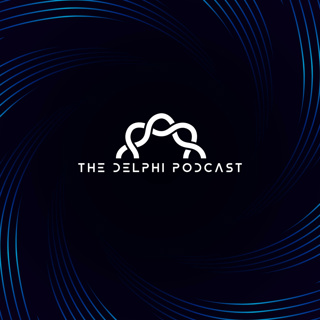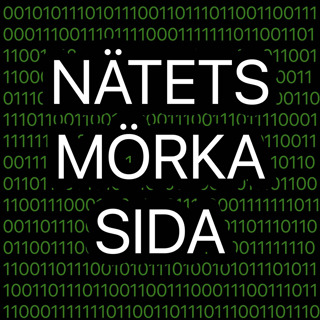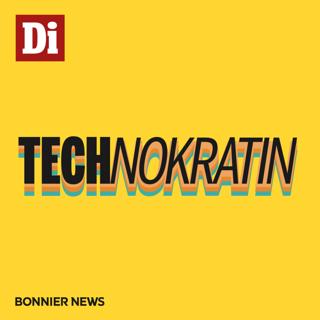
Eric Feigl-Ding: The Coronavirus Pandemic is Inevitable
Host Tom Shaughnessy sat down to speak on short notice with Eric Feigl-Ding, PhD, an epidemiologist, health economist, and nutrition scientist at the Harvard Chan School of Public Health to discuss the Coronavirus (COVID-19). Eric has been an extremely informative source on the Coronavirus, and we discussed all aspects of the virus from what it is, to transmission rates, to outlook and vaccines and some potential outcomes. I really appreciate Eric taking the time on such short notice to sit down and discuss the virus. Eric's experience speaks for itself; he was noted for his role as a whistleblower and leader of a key two-year-long investigation into the controversial drug safety and risk data of Vioxx®, Celebrex®, and Bextra® that drew FDA and national attention. He has published in leading journals, including the New England Journal of Medicine, Journal of the American Medical Association, The Lancet, and Health Policy. His 150+ publications have received 62,000 citations (H-Index 72). As a Web of Science Highly Cited Researcher, He was ranked in 2018 as among the Top 1% of all scientists worldwide. Given the urgency of this episode, I am releasing this outside of our normal programming. Resources: Eric's Twitter Eric's BIO Support The Show ZenLedger is the official tax software of Chain Reaction for crypto investors and accountants. Get a 15% discount when you use code Chain15. https://bit.ly/3bundEl Check out eToro to Create Your Perfect Crypto Portfolio www.b.tc/etororeaction Visit Delta Exchange For A $10 Welcome Bonus! https://www.delta.exchange/Tom Disclosures: This podcast is strictly informational and educational and is not investment advice or a solicitation to buy or sell any tokens or securities or to make any financial decisions. Do not trade or invest in any project, tokens, or securities based upon this podcast episode. The host may personally own tokens that are mentioned on the podcast. Tom Shaughnessy owns tokens in ETH, BTC, STX, SNX, RUNE, sUSD and HNT. Lets Talk Bitcoin is a distribution partner for the Chain Reaction Podcast, and our current show features paid sponsorships which may be featured at the start, middle and/or the end of the episode. These sponsorships are for informational purposes only and are not a solicitation to use any product or service. Music Attribution: Cosmos by From The Dust | https://soundcloud.com/ftdmusic Music promoted by https://www.free-stock-music.com Creative Commons Attribution 3.0 Unported License https://creativecommons.org/licenses/by/3.0/deed.en_US
26 Feb 202052min

Brooke Pollack: From A $8B Venture Capital Platform To A Crypto Fund of Funds
Host Tom Shaughnessy talks to Brooke Pollack, Founder and Managing Partner of Hutt Capital. They discuss the differences between traditional VC funds and VC within blockchain, how Hutt Capital chooses investments and more. Episode Highlights: After a lot of work with investing and VC, Brooke steered Greenspring Associates into work with crypto and blockchain before eventually founding Hutt Capital. In his work with very wealthy families as clients, Brooke had trouble convincing them to invest in Bitcoin and digital currencies because they prefer something tangible, so he needed to do a lot of educating. Blockchain is growing its market share of VC deal activity. There were over 600 blockchain deals in 2019. Brooke thinks the tipping point for when larger firms will have to stop ignoring crypto is when they’re forced to pay attention to the returns they see happening that they want to have a part of. Hutt’s goal is to provide diversified exposure to blockchain in a low-risk, low-volatility way. They invest in startup funds and then use that revenue to directly invest in the best companies. When deciding what to invest in, Brooke looks for insight from his network and the reputation of the companies. Hutt has a global outlook. In choosing what to invest in, in the blockchain space, you don’t have the track record or long-term reputation to look at because most of these companies haven’t existed for very long, and if they have, the market has changed massively in that time. All of this decision making is done through relationship building, which can take years. One of the biggest structural changes to venture funds has been the advent of hybrid funds that call themselves venture funds, but are actually just less liquid versions of hedge funds. Most people will simply not invest in your first fund, so take a long view of those relationships. It’s hard to prove your qualifications to invest in this space without having done it. Key Points: There is a high level of self-educating that is required to enter into the blockchain space. Hutt Capital seeks to provide an entry point to blockchain investing that is low-risk and low-volatility. Choosing funds is all about relationship building. Quotes “I think it’ll happen sooner than later. I think the education process a lot of these groups are going through over the next year or two will lead to meaningfully more institutional capital coming into the space.” –Brooke Pollack “Looking at funds in this space versus general venture investing, you don’t have the breadth of a track record to go off of… Most of these funds haven’t been around for more than a couple of years.” –Brooke Pollack “It’s hard to prove that you can be successful as an investor in this space if you have not yet been an investor in this space.” –Brooke Pollack Support The Show ZenLedger is the official tax software of Chain Reaction for crypto investors and accountants. Get a 15% discount when you use code Chain15. <li style="font-weight:4
24 Feb 202039min

RockTree’s Omer Ozden and Kevin O’Brien: China’s Mammoth Blockchain Market Opportunity
Host Tom Shaughnessy talks to Omer Ozden and Kevin O’Brien, CEO and Managing Director of Rocktree Capital, respectively. They discuss the China blockchain market versus the US, tech innovation, the move to cashless economies, and more. Key Points US tech innovation is stifled by regulatory restrictions as compared to China. It’s of the utmost importance to be sure you’re legally compliant from the beginning to avoid huge problems later. China is at the forefront of a global movement towards cashless economies. Episode Highlights Rocktree Capital’s biggest presence is in China. Presence in China is important for liquidity and capital. If New York is the fastest market in the US, China moves even faster. Rocktree Capital aims to be a bridge to unite the US and China blockchain markets. All Western companies need to have a China strategy. The best innovators come from the US but our regulatory systems are prohibitive and are making us lose to China in tech. Analysts in the US get very little of their research and analysis from China; maybe only 15% is reliable information. Bitcoin is just as important in Asian countries as it is in the US. DCP is the legal digital currency of China with P2P settlement, and Omer doesn’t predict it will take long for widespread adoption because China is already a primarily cashless economy. Other Asian and African countries will move in the cashless direction over the next few years. There will likely be some government investment in blockchain but there will be more private investing. What does coronavirus mean for crypto in China? Quotes “You’re talking about a population unlike the West [that is] fragmented across other channels, whereas in the greater China market, people are unified across one social channel called WeChat, so you have 1.3 billion people across a single social platform.” –Kevin O’Brien “Everybody focuses on the tech, but if a company doesn’t pay attention to legal compliance, first of all from an investor standpoint, it’s not gonna hit the valuation, there’s a lot of risk and it could even go to zero.” –Omer Ozden “A day in the life of somebody in crypto is a year for anybody else.” –Omer Ozden In China, we say 币圈一天,人间一年 or “Bi Quan Yi Tian, Ren Jian Yi Nian” - Which means: “A day in the life of someone in cryptocurrency is a year for anyone else” - Omer Ozden In China, RockTree calls this investment theme “Hua Er Jie Er Dian Ling: “Wall Street 2.0” - Omer Ozden Support The Show ZenLedger is the official tax software of Chain Reaction for crypto investors and accountants. Get a 15% discount when you use code Chain15. https://bit.ly/3bundEl Check out eToro t
21 Feb 202058min

Celsius’s Founder Alex Mashinsky: Interest Income Is Crypto’s Killer App
Host Tom Shaughnessy talks to Alex Mashinsky, CEO of Celsius Network. Alex discusses the impetus for creating MOIP (Money over IP) and Celsius Network, what has prevented blockchain from becoming mainstream thus far, and his predictions for the future of MOIP technology. Key Points: There is a high barrier to entry for new users of crypto and blockchain technology. The shift for crypto becoming mainstream will be generational. 2020 will be a defining year for crypto adoption. Quotes “The main thing that I think is the killer app is the idea that you can do something that you could not do any other way with any other platform.” –Alex Mashinsky “We need to grow the crypto community first before there’s enough demand for all of these products to start migrating from the traditional Wall Street and Main Street services to the crypto rails.” –Alex Mashinsky Support The Show ZenLedger is the official tax software of Chain Reaction for crypto investors and accountants. Get a 15% discount when you use code Chain15. Check out eToro to Create Your Perfect Crypto Portfolio Episode Highlights: Alex has raised over $1 billion in capital for several startups over the past 30 years and is one of the developers of VOIP technology. It’s easy to get people to use VOIP, but much harder to get people to trust you with their money for new banking technology and MOIP. Celsius Network creates interest-bearing accounts for people who hold crypto and lending with crypto. There’s a high bar for involvement with Celsius Network because you have to understand crypto first. The banking industry will not survive as is if crypto becomes mainstream; they would have to evolve their entire business structure dramatically. When VOIP came about, it massively disrupted phone companies, who made most of their money off long distance call charges. Children today don’t see digital currency as foreign because they already play games that use tokens as currency; what’s foreign to them is their parents writing checks. The blockchain community has thus far failed to convince the average person that it’s something more than just a toy for techies. Celsius has now raised the bar for other crypto and blockchain companies and many of them have started to offer interest on deposits, but none has better rates than Celsius does, on every service they offer. What Celsius does is make services that in the mainstream are only available to the top 1%, available to everybody. Celsius created their own token that they treat essentially as airline miles—something that incentivizes them to continue using the platform. You can choose whether you want to earn interest in your stable currency or in the Cel token. Resources Mentioned: Chain Reaction Twitter: https://twitter.com/chainpodcast Tom Shaughnessy Twitter: https://twitter.com/Shaughnessy119
19 Feb 202043min

Tlon CEO Galen Wolfe-Pauly: Urbit Is The Personal Operating System For The 21st Century
Host Tom Shaughnessy talks to Galen Wolfe-Pauly, CEO of Tlon, which is building out Urbit. Galen discusses his vision for Urbit, how developers can work with it, what’s on the horizon for Urbit in the near future, and more. Episode Highlights: Galen learned programming really young and was interested in web and app design. Urbit functions like an operating system rather than an app and provides a better user experience. Urbit is the platform from which you contact the blockchain, and Galen sees them as two systems working cooperatively. Galen’s vision for Urbit is for it to be the ultimate productivity tool. Tom summarizes Urbit as a general-purpose code base that people can use as their own personal cloud computers. Galen hopes this is the technology that you are able to use less because you don’t have to think about it as much and doesn’t incentivize them by mining their data. There will be a finite number of users on the platform to retain its security and value, through address blocks. Developers will own pieces of the system through these address blocks, incentivizing them to improve the system. Urbit is designed for digital communities to shape their own environments. The most important thing with new technologies is their stickiness. Many Bitcoin users have adopted Urbit because it has an authenticated digital identity through which you can communicate with people and transact. As people adopt Urbit, either platforms will develop to run on Urbit or they’ll simply go away, like AOL did when the Internet grew. Galen wants an actual archive of his data that won’t go away when the company folds, which most things will. Now that the Urbit infrastructure is stable and reliable, they’re now shifting to think about it as a product. Galen most worries about Urbit’s current shift towards wanting users who don’t care about the technology. Key Points A big reason more people haven’t adopted blockchain technology is that it has terrible user experience and is too difficult to operate. The most important thing for new technology’s longevity is its stickiness with a particular population of users. All technology will eventually go away and be replaced by something else. Tweetable Quotes “If you’re a developer it should be easy to build on top of this whole stack. You ship to the network & when people install it, they can easily port their data from one thing to the next. So you have more fluid competition between different alternatives.” –Galen Wolfe-Pauly “We have the benefit of these early incentives from relatively technical address space holders & honestly just people who think this is really fun. Which I think is bigger than people think. A lot of the internet was built either for fun or on a gov't grant.” –Galen Wolfe-Pauly Support The Show ZenLedger is the official tax software of Chain Reaction for crypto investors and accountants. Get a 15% discount when you use code Chain15. <a href='https://www.etoro.com/?dl=30001923&utm_medium=Affiliate&utm_source=81727&utm_content=0&utm_serial=reaction&utm_campaign=reac
18 Feb 202055min

Fidelity Digital Assets’s Ria Bhutoria: The Paperwork Crisis to Crypto Custody Today
Host Tom Shaughnessy talks to Ria Bhutoria, Director of Research at Fidelity Digital Assets. Ria discusses her recent article about Omnibus model, the importance of proof of solvency, technological developments in crypto and DeFi in financial institutions, and more. Key Points The omnibus account model has been important to large financial institutions as the cryptocurrency market has grown. Using omnibus accounts with digital assets means some value is stored online and some is stored offline. Large financial institutions are buying into digital assets and developing new technology for it slowly, but surely. Tweetable Quotes “It’s easy to get lost in the day-to-day, and we’re so used to seeing constant news flow and announcements that it really takes taking a step back to realize how much progress we’ve actually made.” –Ria Bhutoria “There’s a lot of development going on, and a lot of it is just seemingly small improvements, but in aggregate I think it’s making the whole ecosystem more robust and stronger.” –Ria Bhutoria Episode Highlights: What is Ria’s background and how did she end up at Fidelity Digital Assets? The Omnibus model means that assets of multiple parties are combined and service providers establish segregation between clients in their books and records. Omnibus accounts came into existence after a paperwork backlog crisis in the 1960s and 1970s. The omnibus model helps improve liquidity for the account custodian. The ratio of what you have stored in cold offline storage vs hot online storage matters. Ria explains why ‘proof of solvency’ is important. Ria and Tom are excited by the increase in major financial institutions developing technology and increasing their understanding of digital assets to embrace cryptocurrency. There’s a lot of high-level development happening in the crypto tech space, but it takes a long time to implement changes the average user can see. Ria is most excited to see the kinds of services that institutions are going to offer to extend beyond what’s offered for traditional asset classes. There’s a range of experience and interest in DeFi, given that many people still don’t even understand Bitcoin. Fidelity has been doing research in digital assets by mining Bitcoin for years. Support The Show Check out eToro to Create Your Perfect Crypto Portfolio Resources Mentioned: “The Omnibus Model for Custody” by Ria Bhutoria: https://medium.com/@FidelityDigitalAssets/the-omnibus-model-for-custody-96b69710f92d Fidelity Digital Assets Website: https://www.fidelitydigitalassets.com/overview Ria Bhutoria Medium: https://medium.com/@riabhutoria Ria Bhutoria Twitter: https://twitter.com/riabhutoria Ch
6 Feb 202040min

Camila Russo: A Deep Dive Into Ethereum’s Inception
On this episode, Host Tom Shaughnessy is joined by Camila Russo, founder of the Ethereum based newsletter The Defiant and author of the coming book on the birth of Ethereum titled, The Infinite Machine: How an Army of Crypto-hackers Is Building the Next Internet with Ethereum. We dive into why Camila decided to research Ethereum's early life, how she has been tirelessly researching the protocol for months and what to expect from her new book. Pre-order here while you're listening. About The Book Everyone has heard of Bitcoin, but few know about the second largest cryptocurrency, Ethereum, which has been heralded as the "next internet." The story of Ethereum begins with Vitalik Buterin, a supremely gifted nineteen-year-old autodidact who saw the promise of blockchain when the technology was in its earliest stages. He convinced a crack group of coders to join him in his quest to make a super-charged, global computer. The Infinite Machine introduces Vitalik’s ingenious idea and unfolds Ethereum’s chaotic beginnings. It then explores the brilliant innovation and reckless greed the platform—an infinitely adaptable foundation for experimentation and new applications—has unleashed and the consequences that resulted as the frenzy surrounding it grew: increased regulatory scrutiny, incipient Wall Street interest, and the founding team’s effort to get the Ethereum platform to scale so it can eventually be accessible to the masses. Financial journalist and cryptocurrency expert Camila Russo details the wild and often hapless adventures of a team of hippy-anarchists, reluctantly led by an ambivalent visionary, and lays out how this new foundation for the internet will spur both transformation and fraud—turning some into millionaires and others into felons—and revolutionize our ideas about money. Resources Mentioned: Pre-order The Infinite Machine The Defiant Newsletter Camila's Twitter Chain Reaction Twitter: https://twitter.com/chainpodcast Tom Shaughnessy Twitter: https://twitter.com/Shaughnessy119 eToro Offer: b.tc/etororeaction Support The Show Check out eToro to Create Your Perfect Crypto Portfolio Delphi Digital's Research Disclosures: This podcast is strictly informational and educational and is not investment advice or a solicitation to buy or sell any tokens or securities or to make any financial decisions. Do not trade or invest in any project, tokens, or securities based upon this podcast episode. The host may personally own tokens that are mentioned on the podcast. Tom Shaughnessy owns tokens in ETH, BTC, XTZ, STX, SNX, RUNE, sUSD and HNT. Lets Talk Bitcoin is a distribution partner for the Chain Reaction Podcast, and our current show features paid sponsorships which may be featured at the start, middle and/or the end of the episode. These sponsorships are for informational purposes only and are not a solicitation to use any product or service. Advertisers: To be a sponsor
4 Feb 202034min

Blockchain Capital’s Aleks Larsen: The Tsunami Of DeFi Innovation
Host Tom Shaughnessy talks to Aleks Larsen, part of the Investment team at Blockchain Capital. Aleks discusses issues with decentralization, DeFi growth and opportunities, what place security tokens hold in the DeFi space, and more. This episode builds on a recent episode we hosted with Blockchain Capital's Spencer Bogart. Key Points Nothing is entirely decentralized yet because we’re still learning best practices for blockchain and DeFi tech. The user experience on DeFi is generally lacking, and to grow the user base that will have to change. There are a lot of opportunities with blockchain and DeFi in financial services to address global disparities in access to banking. Tweetable Quotes “If your token doesn’t accrue value, it’s going to be really hard long-term to align incentives within your ecosystem. No one’s gonna want to hold it. So the most attractive tokens are going to attract people to use it for reasons other than the service itself.” –Aleks Larsen “Over time, we’re going to figure out some things that work, and over time, the points of failure that exist today, or the points of centralization, will hopefully become less of an issue.” –Aleks Larsen Episode Highlights Aleks was working in traditional investments, but became interested in DeFi as he casually researched Bitcoin and Ethereum on his own. Choosing new projects to invest in comes down to intangibles; Aleks doesn’t have a strict framework or methodology around choosing. Right now, there’s a lot of experimentation and testing in DeFi tech, trying to find a model that will work more broadly. Most DeFi platforms aren’t entirely decentralized yet. In the early days of a chain, it’s safest to have a point of centralization so that there’s a failsafe as the tech develops and loopholes or bugs are discovered. Aleks doesn’t see faster transaction speeds as a significant enough advantage over secure transaction settlement, so if you have to wait a few minutes for space on a chain, that should be okay. Some of the most interesting new tokens from Aleks’s perspective are ones that give you voting rights, feel like equity, or outright gives dividends. Tokens now often have use cases beyond just raising money, including as collateral for other tokens. The amount of assets you have locked in DeFi is not the best metric to use for value because it really comes down to volume of transactions. Aleks believes the DeFi space is ambitious and optimistic, but launching new products usually takes 2-3x longer than predicted. New applications either need to address a market that has been experiencing significant pain, or it needs to create a big market that hasn’t existed before. Adding open source applications to your stack, like a savings account that you can access anywhere, is of huge value for use cases like developing countries where millions of people do not have access to basic banking. Facebook’s move into crypto with Libra is an interesting way to make financial services available to people who don’t otherwise have access to banking. Security tokens have unexplored potential to redefine what it means to own something in the digital age. Security tokens simply aren’t a good way to raise money. Aleks thinks at least for the for
24 Jan 202045min





















